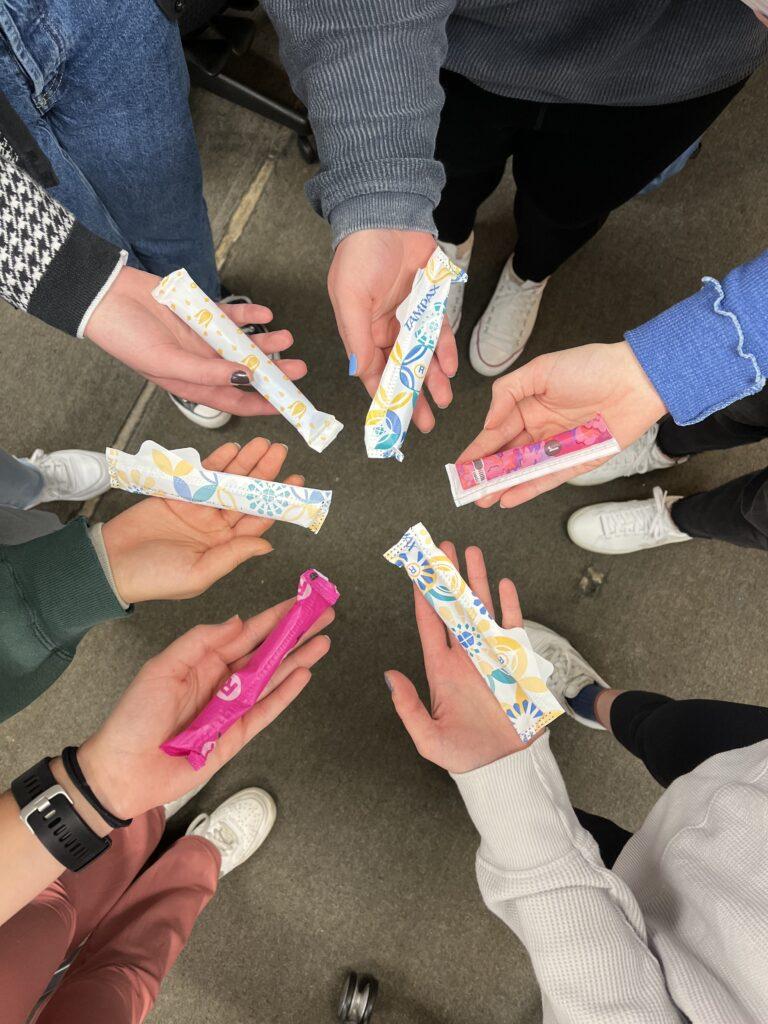Washington, D.C. public, charter and private schools must now provide free period products in women’s and gender-neutral bathrooms.
During the D.C. Council’s first legislative session of 2022 on Jan. 4, councilmembers unanimously passed the Expanding Student Access to Period Products Act of 2021. The bill will require period products to be made available in women’s and gender-neutral bathrooms in all middle, high and post-secondary schools across the District, as well as in at least one bathroom in elementary schools.
Schools that do not have a gender-neutral bathroom must provide period products in at least one men’s bathroom. In addition, the legislation includes a provision requiring the D.C. State Office of the Superintendent of Schools to establish comprehensive menstrual health education standards for middle and high school District students.

Ward 2 Councilmember Brooke Pinto (LAW ’17) introduced the legislation in March 2021. Pinto had secured funding in the D.C. Council’s Fiscal Year 2022 Budget to allow the legislation to go into effect this fiscal year.
Access to period products is directly tied to educational success, mental health and physical health, according to Pinto.
“When students don’t have access to the period products they need, they miss school, fall behind their peers, and are more likely to experience depression and anxiety,” Pinto wrote in a statement to The Hoya. “This is particularly concerning right now as the number of mental health crises experienced by teenage girls has skyrocketed during the pandemic.”
H*yas for Choice (HFC), a Georgetown led pro-abortion student group, collaborated with advocacy groups such as Planned Parenthood to ensure the bill was considered by the D.C. Council, according to HFC President Chloe Kekedjian (COL ’22).
“We worked with the local Planned Parenthood to help gather signatures to petition the city council to hold a hearing on the bill,” Kekedjian wrote in an email to The Hoya. “This is meaningful because menstrual equity is a serious problem, and can be an impediment to people’s learning when they cannot access menstrual products.”
In the past, students have raised concerns about the lack of access to menstruation products on Georgetown’s campus. Out of 43 academic buildings on campus only 15 have menstrual products available, according to a 2019 HFC received from the Office of Planning and Facilities Management. A survey that HFC distributed in 2019 found that 95.6% of Georgetown undergraduate students believed the university has a responsibility to provide period products on campus.
The bill will ensure Georgetown University provides period products to nonbinary and transgender students, according to Kekedjian.
“This bill is great because now Georgetown has a legal commitment to provide menstrual products to students, especially to nonbinary and trans students,” Kekedjian wrote. “Georgetown administration was much less enthusiastic about meeting the menstruation needs of those students and now they will have to.”
The passage of the bill will have a major positive impact on the experience of menstruating students in the District and aid in combating the stigma around menstruation, according to Sophie Axelrod, a high school senior at Georgetown Day School.
“While on my period, carrying tampons to the bathroom is always a hassle, and I have to strategically hide one in my sleeve or put in my pocket without others looking,” Axelrod wrote in a message to The Hoya. “It is annoying how I feel the need to hide the fact that I am on my period.”
Access to period products as compared to access to products like contraceptives is a double standard, according to Axelrod.
“Why should we (as female-bodied individuals) have to pay for these products when we cannot control our bodily functions?” Axelrod wrote. “In other public places (other than high schools), condoms are usually free for male-bodied people, while women have to pay for pads and tampons in bathrooms.”
Federal food assistance programs do not cover period products, disproportionately affecting low-income residents, according to Pinto. Furthermore, period poverty disproportionately impacts Black and Brown girls and women in the District, Pinto said.
Many D.C. high school students advocated for the legislation to the Council at a hearing, according to Pinto.
“The Council heard from several high school students including several high school boys who spoke about not being taught about menstruation in sexual education,” Pinto wrote. “Instead, they had to learn about it through their female peers. When they came to understand that period poverty was preventing their friends from attending class, they leapt into action and testified before the Council about the need for providing free period products in school bathrooms and comprehensive menstrual education for all students.”
Pinto said student advocacy efforts were key to the passage of this bill, as students helped to refute arguments that this issue should not be a priority during the pandemic.
“I hope this process has shown students that their voices are powerful!” Pinto wrote. “Their advocacy can lead to policy change and help to combat the dangerous stigma around menstruation.”




















